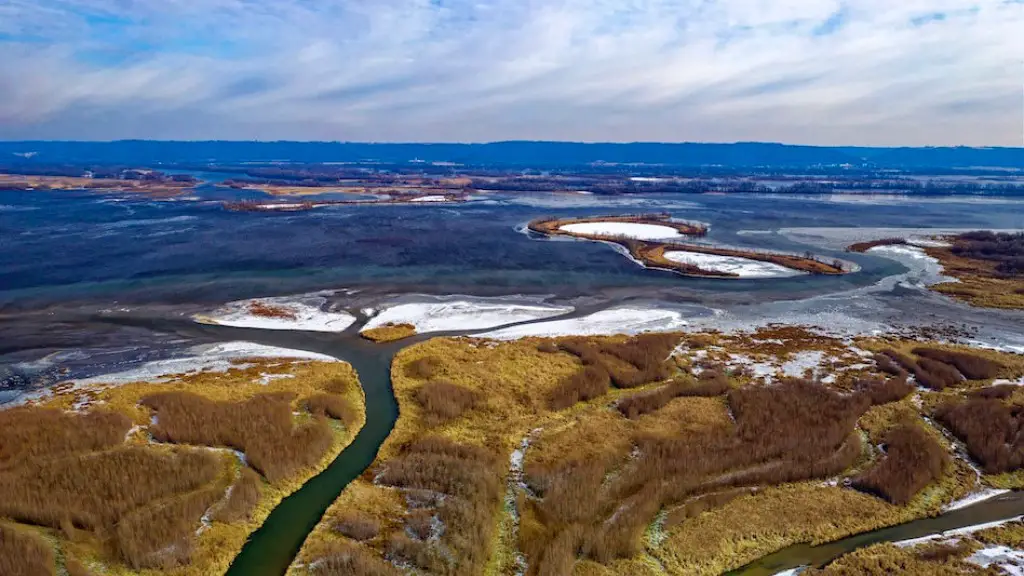Background Information
The Nile River is one of the longest rivers in the world and is often considered to be the lifeblood of ancient Egypt. It has been used since ancient times as a source of food, water, trade, and even worship. As such, it has been central to the economic and social development of the Egyptian civilization.
The Nile has provided a reliable source of fresh water to the region for thousands of years, which enabled the population to establish settlements along its banks. It also provided a direct connection between the Mediterranean Sea and the Upper Nile, making the region more accessible for trade and communication. The annual floods served to replenish the soil, which made the land more fertile for farming and ensured a plentiful supply of food for the people of ancient Egypt.
The Nile River allowed for the development of trade, both within Egypt and with other lands. This provided the opportunity to access valuable goods such as lumber, gold, spices and incense. This opened up vast opportunities for wealth acquisition and allowed for the growth of cities and the construction of monumental buildings.
Religion
The religion of the Ancient Egyptians was closely tied to the Nile, and their gods and goddesses were closely associated with the river. The most important of these deities was the god of the Nile, Hapi. He was believed to be responsible for the annual flooding, which was seen as a gift from the gods. The flood waters were seen as a symbol of renewal and regeneration, and this was closely tied to the rebirth of the gods and the continuous cycle of life.
The annual flood created a rhythm for life in ancient Egypt, providing an essential source of water and food for the population. This cycle of life and death, renewal and regeneration was seen as a reflection of the gods, and rituals and festivals were held to honor them and give thanks for the floodwaters that sustained the civilization.
Agriculture
The Nile was essential to the success of the ancient Egyptians and was the main source of water for agriculture. The floodwaters brought silt which enriched the soil, making it fertile and allowing for increased crop yields. This allowed for a greater population and more food. Moreover, the availability of water enabled farmers to use irrigation systems, which allowed them to get the most out of their allocated land.
The ability to store and transport food was made easier by the Nile as well. From an early period, boats were used to transport goods and offerings between settlements along the river. This transportation network allowed for the construction of stronger bonds between cities, which helped to further create a unified Egypt.
Economic Benefits
The Nile River provided a safe and reliable route for trade, which allowed for a prosperous economy and the growth of the ancient Egyptian civilization. As a result, the Egyptians were able to access valuable goods such as ivory, stone, spices, and perfumes from other lands. This allowed for the acquisition of wealth and the development of cities. Thanks to the Nile, commerce and trade was able to take place between cities and with other lands, and this further solidified Egypt’s hold on the region.
Moreover, transport along the Nile was made easier by the construction of canals, aqueducts and dams, which allowed for a steady flow of goods and resources to be transported along the river. This increased the efficiency of trade and made it easier for goods to be exchanged between cities and with other civilizations.
The growth of trade allowed for the development of industries and craftsmanship, which further strengthened the economy of ancient Egypt. This enabled the ancient Egyptians to have access to a range of goods and services, and made commerce an integral part of their existence.
Military Benefits
The importance of the Nile in ancient Egypt doesn’t stop with trade. It also provided a consistent and reliable form of transportation, which was essential in military campaigns. The river allowed for a swift and strategic movement of troops, supplies, and other materials, which enabled the Egyptians to take on larger enemies such as the Hittites and the Assyrians.
The Nile also provided a convenient form of defence, since it presented a substantial obstacle to enemy forces. The Egyptians built fortifications along the river in strategic areas, which helped to protect the population from the threat of invasion. This enabled the Egyptians to maintain their autonomy and enabled them to remain in control of the region for centuries.
Overall, the Nile River has been essential to the development and success of the ancient Egyptian civilization. Its contribution to the economy, religion, agriculture, and military strength is unparalleled. Its presence in the region has been a constant source of sustenance, security, and wealth for centuries, making it one of the most important and influential rivers in the world.
Technology
In addition to its economic and military benefits, the Nile River also played an important role in the development of technology in ancient Egypt. Thanks to its abundance of fresh water, the river was able to provide a reliable and consistent source of energy for the development of various technologies.
The Nile allowed for the construction of dams and canals, which enabled the Egyptians to control and manage the water supply. This made it possible for the construction of irrigation systems, which in turn allowed for the efficient water management and production of food. The development of tools and technologies such as the sundial and water clock were also made possible thanks to the Nile, and these inventions allowed for a more efficient management of time and resources.
The Nile also enabled the development of boat technology, which made it possible for the Egyptians to traverse the vast river and explore the lands beyond. This allowed them to trade goods with other settlements, and to develop and expand their civilization further.
The presence of the Nile River was essential to the success of the ancient Egyptians. It provided a reliable source of water and food, and enabled the development of trade and technology. As such, it played a crucial role in the development and prosperity of the ancient Egyptian civilization.
Construction
The importance of the Nile River did not only lie in its economic and military benefits, but also in its contribution to the development of architecture in the region. The Nile provided an abundant amount of stone, which was used in the construction of various monuments, such as temples, pyramids, and palaces.
The river also allowed for the construction of large and impressive monuments, such as the Great Pyramid and the Valley of the Kings. Its presence meant that the Egyptians were able to access and transport large amounts of stones to the region, allowing for the construction of these monumental constructions.
The Nile also enabled the development of stronger and harder materials, as well as more durable cement, which was used in the construction of monumental structures. This allowed for the construction of structures that could last for centuries, and monuments such as the Great Pyramid still stand today as a testament to the strength and resilience of ancient Egyptian architecture.
Overall, the Nile River provided essential resources to the ancient Egyptians, which enabled them to construct monuments that would last for centuries. Its contribution to architecture and technology in the region is unparalleled, and it played a crucial role in the development and success of the civilization.
Cultural Significance
The importance of the Nile River in ancient Egypt cannot be overstated. It was a source of sustenance, health, and wealth, and its presence in the region allowed for the stability and sound development of the civilization. As such, it was seen as a symbol of strength and resilience, and its power was reflected in the culture and religion of the people.
The Nile River was seen as a source of life and fertility, and this was reflected in the worship of the gods of the river. Festivals and rituals were held in honor of the floodwaters and the gods that provided them, and the annual cycle of life and death was seen as a gift from the gods. It was believed that the gods watched over the river, and that its power was a reflection of the gods’ power.
These beliefs had a profound effect on the people of ancient Egypt, and the significance of the Nile served to further enhance the culture of the region. It inspired new forms of art, architecture, and technology, and it helped to shape the identity of the Egyptians. It was, and still is, a symbol of strength and prosperity, and its legacy in the history of ancient Egypt is undeniable.
Conclusion
The Nile River has shaped the history of Egypt and its people since ancient times. Its presence has enabled the growth and prosperity of the civilization, and it continues to be a source of life and sustenance in the region. Its contribution to the economy, military, agriculture, technology, and even culture are unparalleled, and it is clear that the Nile River has been essential in the development and strengthening of the ancient Egyptians.





